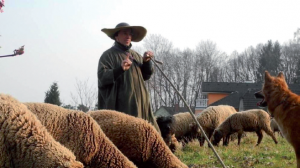FEATURES Focus on the Refugee Crisis
“You shall not oppress a stranger, for you know the feelings of the stranger, having yourselves been strangers in the land of Egypt,” (Exodus 23:9). The biblical ethic urges us to welcome foreigners but on the other hand, as explained to Pagine Ebraiche by rav Alberto Moshe Somekh, the highest level of tzedakah is giving to the poor and the needy the means to support themselves. The most advanced nations should help the less developed ones not just from an economic point of view, but also from a cultural one, said the rabbi. These are two possible solutions from a Jewish prospective to the refugee crisis that is changing the face of Europe. As rav Somekh points out, there are many others as well. The newspaper Pagine Ebraiche has devoted a special section of this month’s edition to help us discover and reflect on some of the different suggestions that people and institutions have given to the issue of migration.
The paper features the story of the Austrian shepherd Hans Breuer, who sings Yiddish melodies while he helps Syrian refugees to pass the border between Hungary and Austria. The Holocaust Memorial of Milan and the Jewish Community of Turin have both decided to commit to hosting refugees. The Holocaust Memorial has hosted more than 3,000 people since last June. The Community of Florence offers an apartment for the refugees, as Florence city council member Sara Funaro explained to Pagine Ebraiche, talking about the integration policy.
The challenge of welcoming the stranger is deeply rooted in Judaism. Rav Giuseppe Momigliano, president of the Italian Rabbinical Assembly and rav Jonathan Sacks both offer their take on the matter, emphasizing that hospitality and saving lives are fundamental mitzvots.
Israeli jurist Aharon Barak points out how these are matters of human dignity, offering the perspective of the law on these issues.
Also Jews have experienced the violation of their human dignity many times in their history. Among others, this happened in Libya half a century ago, when violence forced the local Jews to flee to Italy. Pagine Ebraiche presents the stories of some of those who fled, along with the challenges that people who are forced to decide to change their life face: as for example the growing number of French Jews who are making aliyah to Israel, and sometimes decide to move back.

